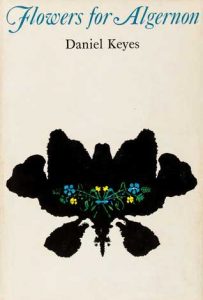 “FLOWERS for Algernon” is a science fiction short story by Daniel Keyes. It won the Hugo Award for Best Short Story in 1960 and went on to be expanded into a full-length novel and later was converted into a film. The constant exploration of the depths of the original short story that has been manifested in the forms of a novel and film, and other subsequent adaptations, is a good indicator that the main plot of Keyes’ tale is something that readers and audiences have continuously returned to, which not only underscores its entertainment value, but also the allure (whether on account of its science fiction, psychological or emotional value) that the tale inherently possesses.
“FLOWERS for Algernon” is a science fiction short story by Daniel Keyes. It won the Hugo Award for Best Short Story in 1960 and went on to be expanded into a full-length novel and later was converted into a film. The constant exploration of the depths of the original short story that has been manifested in the forms of a novel and film, and other subsequent adaptations, is a good indicator that the main plot of Keyes’ tale is something that readers and audiences have continuously returned to, which not only underscores its entertainment value, but also the allure (whether on account of its science fiction, psychological or emotional value) that the tale inherently possesses.
The plot of the story concerns a factory worker named Charlie, who, on account of his low IQ, signs up to be part of a scientific experiment that aims to make him three times smarter. The experiment has already been conducted on animals, including a mouse named Algernon, and it is a success with both Algernon and Charlie. However, the effect is only temporary, and so, both Charlie and Algernon become three times smarter and then they start to regress to their old selves. The rest of the plot concerns the changes that take place in Charlie himself after the experiment, the way he sees the world and other people (including his doctors, co-workers and teacher), the way he sees himself before the experiment, and the aftermath of undergoing the procedure.
From a Formalist literary perspective, where the form of the text becomes an important part of analysis, “Flowers for Algernon” is fascinating in terms of the language the story is written in, as Charlie is the one telling us the tale through the form of progress reports he himself writes. The writing within these reports improves as Charlie’s mental capacities improve and regresses as Charlie’s mind regresses. For example, the first lines written by Charlie are:
progris riport-martch 5, 1965
Dr. Strauss says I shud rite down what I think and every thing that happins to me from now on. I dont know why but he says its importint so they will see if they will use me. I hope they use me. Miss Kinnian says maybe they can make me smart. I want to be smart.
In the sample above, the child-like and imperfect use of the language is an example of the form of the writing being used to tell us about an adult, Charlie, and where he is at mentally – which is significant because the mind and mental faculties are an essential aspect of the story. When this sample is juxtaposed with the sample of Charlie’s writing shown below, which is written after the surgery and after his IQ has tripled, the readers are informed, just by looking at the development of his writing, of how much he has changed.
May 18
I am very disturbed. I saw Miss Kinnian last night for the first time in over a week. I tried to avoid all discussions of intellectual concepts and to keep the conversation on a simple, everyday level, but she just stared at me blankly and asked me what I meant about the mathematical variance equivalent in Dorbermann’s Fifth Concerto.
Of course, this formalist dimension is only one aspect that creates the fascination that can be found within people who read the story. There is a question that raises ethical and moral concerns about mental illness and intelligence; and the concern about the way people who may have mental deficiencies in society are treated is a core part of “Flowers for Algernon.” The way Charlie is treated by both his coworkers at the factory and the scientists who study him echo the dual ends of the spectrum in which differently-abled people in society are treated.
Charlie himself is one of the best parts of the story and he truly is a wonderful creation by the author. He is sympathetic, likable, and an underdog. Charlie and his experiences in life are to be remembered. He stands out as one of those narrators, one of those protagonists, and one of those characters in classic literature, who will always come to mind when the question of great and memorable characters comes around.




.png)









